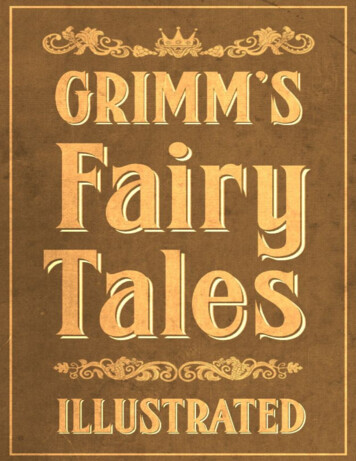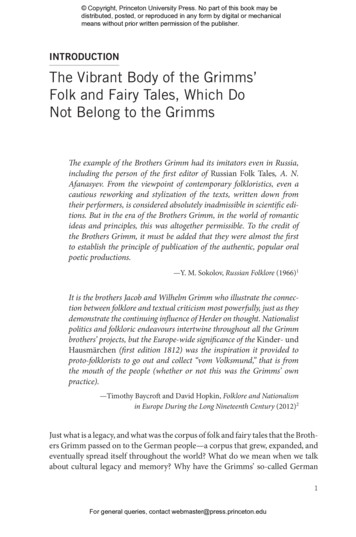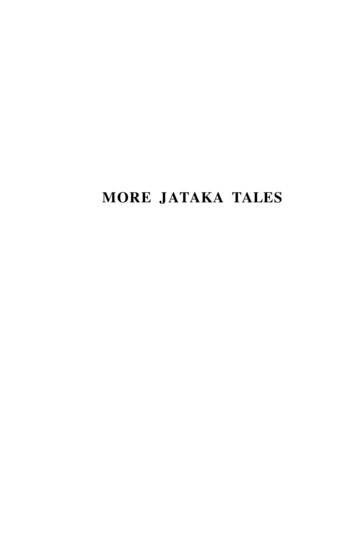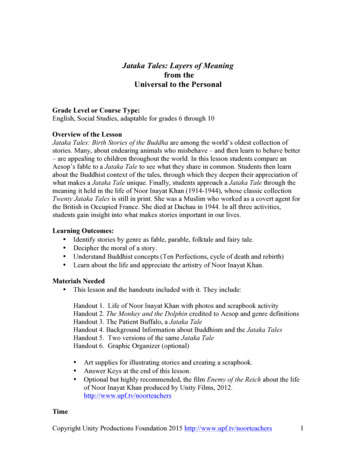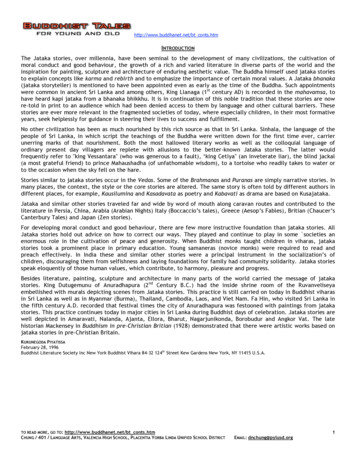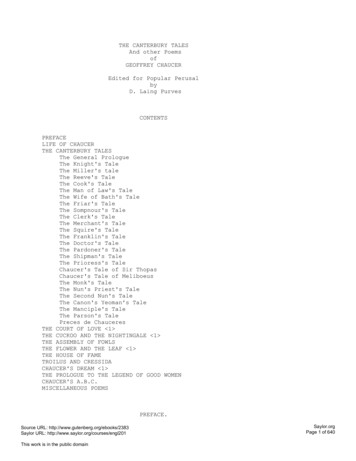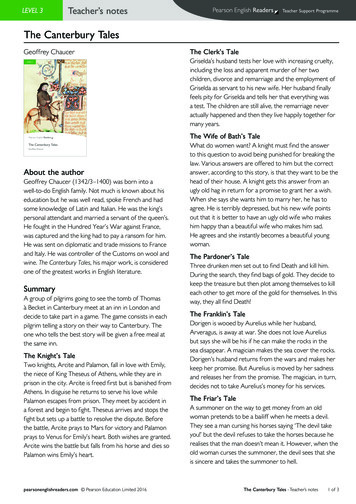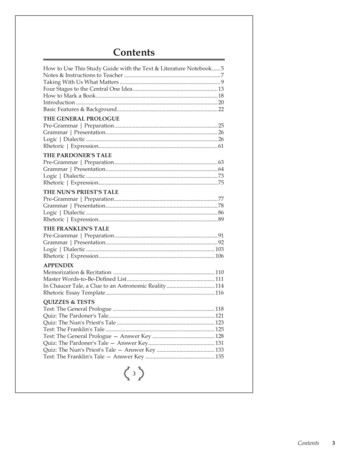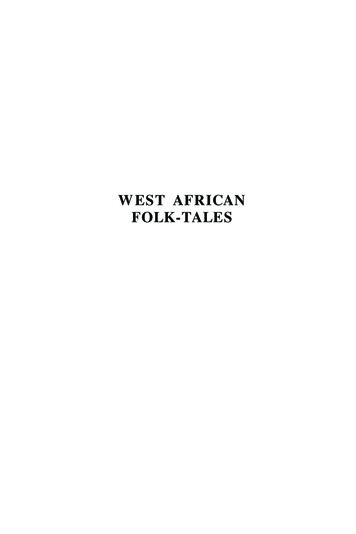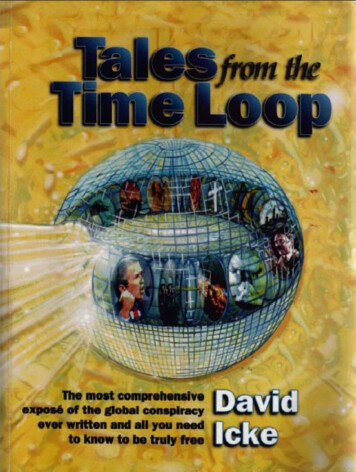
Transcription
Released by RareReactor.tkDedicationT o K erry, G a z a n d Ja yI am so proud of all of you.
One question: one answerCowardice asks the question - is it safe?Expediency asks the question - is it politic?Vanity asks the question - is it popular?But conscience asks the question - is it right?And there comes a time when one must take a position that is neither safe, nor politic nor popular; but onemust take it because it is righ t.Dr Martin Luther King, Jr
The global monarchy"A lot of national leaders recognise that the security of their countries depends on a good relationship withthe US, so they value the opportunity to be received at the White House - the place where all decisions aremade. When America votes [or doesn't] for the person who rules here, it has a huge effect around theglobe. If you're in a bazaar in Cairo or pushing a cart in Shanghai, that choice will have a large effect onyourpersonal security and prosperity."It is therefore important for their leaders to be able to go into the Throne Room. If they're lucky when theyget there, they'll be given a bigger quota for their apples or, perhaps, American backing for the dam theywant to build because we'll vote for the loan in the World Bank. It sound arrogant, 'but it,;. true."Our power is so great, and so unlikely to be challenged for many, many years, that you have to go back toRome for any kind of parallel. It's a misnomer to speak of the United States as being merely a superpower. We're aSIJper-duper power, and I don't know that the world has seen one of those before."A d m iral S tan sfield T u rn er, form er h ead of th e C IADaily Telegraph, June 16th 2003
And a few people can't control the world . ?. it's a piece of cake .
Free your mind ."If the possibility of the spiritual development of all individuals is to be secured, a second kind of outwardfreedom is necessary. The development of science and of the creative activities of the spirit in generalrequires still another kind of freedom, which may be characterized as inward freedom. It is this freedom of thespirit which consists in the interdependence of thought from the restrictions of authoritarian and socialprejudices as well as from unphilosophical routinizing and habit in general. This inward freedom is aninfrequent gift of nature and a worthy object for the individual."Albert Einstein"Those who danced were thought to be quite insane by those who could not hear the music."Angela Monet
We are the ONECan you imagine if we were all together United in a common bondNot disuniting on differencesbecause that is what makes us 'unique? But seeing the force around usTrying to persuade us to fightWhile they sit quietly to the sideNo blood shed, no bodies maimedamong them.But for us ,., we die, we bleed, we suffer At the hands of the force around us,we offerOur minds, our souls, our bodies of gold Only to be forgotten in the wars ofthe world.Open your eyes and take into account That WE are the ONEThat can make this world right. Wake up and stand tallNo matter who you areThis is the nightThey will see their demise and fall Not from a bullet firedNor from a fight among "us" or "them" But from a place in your heartThat says . this is nowAnd we will rise again .Swimming in the delightOf oceans dancing with the Moon light In perfect harmonyWave upon waveIn unison, never knowing There is a difference Between one or anotherI am your sister and you are my brother.Knowing there's a place of stillness That we can go toWithout the pendulum swinging No ebb and flowNo black and white, no left and right, Just a place in my heartThat refuses to flyaway into the night Without giving it my all?There is no YOUThere is no METhere is only the absolute sum Of what WE are ".We are the ONE.Pamela Icke
The how and whyh a v e w ritte n th is b o o k a s a lw a y s to b e s e lf-c o n ta in e d a n d it d o e s n o t re q u ire th e re a d e r toh a v e rea d m y o th e r b o o k s to fo llo w th e in fo rm a tio n a n d c o n c e p ts o f th iso n e. T h a t is es p e c ially im p o rta n t to d a y w ith s o m a n y p e o p le u rg e n tly n e e d in g tou n d e rs ta n d w h e re th e w o rld is b e in g le d , b y w h o m , a n d to w h a t e n d . I h a v e s tru c tu re d th eb o o k to e x p lo re th e v a rio u s le v e ls o f th e g lo b a l c o n s p ira c y a n d th e m a n ip u la tio n o f o u rre ality in th is illu s io n I c a ll th e M a trix . E x p o s u re o f th e Illu m in a ti a g e n d a h as m o s tlyfo c u ss e d o n th e fiv e -s e n s e 'w o rld ', th e n a m e s , d ate s, p lac e s, p e o p le le v e l o f th e c o s m ic'g a m e '. Y o u w ill fin d a lo t o f th a t in th is b o o k , es p e c ially w ith re g a rd to th e in v a s io n o fIra q a n d th e m a n u fa ctu re d 'w a r o n te rro ris m '. T h is in fo rm a tio n is im p o rta n t to k n o w ; b u tw h a t is h a p p e n in g is fa rb ig g e r th a n th a t.T o u n d e rs ta n d th e p lo t a n d d e a l w ith its fiv e -s e n s e e x p res sio n w e n e e d to a p p re cia te fro mw h a t a n d fro m w h e re it all e m a n a tes. I h a v e , th e refo re, w ritte n th e b o o k in fo u r se c tio n sto d es c rib e th e d is tin ct le v e ls o f m a n ip u la tio n a n d c o n tro l m in d h o w th e y c o n n e c tw ith e a c h o th e r. T h e m a in e m p h a s is is o n th e n a tu re o f re a lity - 4 an d h o ww e c re ate it b e ca u s e th is is th e k n o w le d g e th a t w ill se t u s free . O n c e w e k n o w h o w th eg a m e w o rk s a n d h o w w e a re b ein g m a n ip u la te d to m a n ife s t o u r o w n p ris o n , w e c a n fre eo u rs elv e s fro m th o s e c h a in s o f se lf-d e lu sio n .It h as b e e n e ss e n tia l to in c lu d e in fo rm a tio n th at re a d e rs o f m y o th e r w o rk s w ill a lre a d y b ea w a re o f. T h e y m a y w is h to s k ip th o s e se c tio n s a n d c o n c e n tra te o n ly o n th e w ea lth o fn e w in fo rm a tio n , b u t g iv e n th e w a y e v e ry th in g fits in to e v e ry th in g e ls e it m ig h t b e w o rthth e m re m in d in g th e m s e lv es o f w h a t th e y h a v e rea d b efo re to a llo w th e re le v a n c e o f th en e w re v e la tio n s to b e se e n in its s h a rp es t fo c u s.David lcke
RareReactor.tk Release InfoTitle – Tales from the Time LoopAuthor – David IckePublished – 2003 by Bridge of LoveNot included – Index and blurbScanned by – DJHText recognition by – DJH using Readiris Pro 9This is my first attempt at scanning in a whole book and converting it to text. It hastaken me a very long time to get rid of the thousands of errors within this book andthere are no doubt countless errors I haven’t identified.www.rarereactor.tk
1CHAPTER ONEWakey, wakeySit down before fact like a little child, and be prepared to give up every preconceived notion, follow humblywherever and to whatever abyss Nature leads, or you shall learn nothing.T. H. HuxleyI said in my last book, Alice in Wonderland and the World Trade Centre Disaster, that I was at the end ofan era in my life and at the start of new one. I wrote:"Changing reality from 'I can't' to 'I can', from 'small horizon' to 'no horizon', is where my journey takes menow. From exposing the conspiracy to thinking and feeling it out of existence. As the Morpheus charactersays in the movie, The Matrix: ”You have to let all go, Neo; fear, doubt, disbelief. Free your mind.'"I have written some one and a half million words about the manipulation of the human race in this fivesense level of reality by a network of secret societies and groups controlled by unseen forces that place theirpuppets in political, economic, military and media power to advance an agenda for a centralised globalfascist state. It is important that we know this information and continue to add to the knowledge of how weare imprisoned by our 'free world'. But there is more to know and do: much more. I knew that for me to takethe story on and understand the even greater context in which this manipulation is unfolding, I would haveto see into other dimensions of reality beyond the 'world' that we daily experience. This is exactly whathappened to me in the Amazon rainforest of Brazil in 2003. What I learned from these journeys of the mindis the major focus of this book. Many of those who have been reading my work thus far will find some ofthis extremely challenging as we close in, still further, on the nature of the human condition and the forcethat seeks to control and imprison us in a manufactured illusion - 'the Matrix'.Born to be freeWhat happened in the Amazon is the latest stage in a fantastic journey of discovery, or rediscovery, that Iconsciously began in 1990 when my life and perceptions were transformed by events that at one pointthreatened to destroy me., But all they were doing was setting me free from the delusions laid out to entrapus in this prison of the mind. I also realised that, while I only became consciously aware of a guiding forcein 1989, the journey that I continue to travel began from the moment I was born, and in fact, as we measure'time', long before. Many people ask me how I became involved in researching and exposing the globalconspiracy. In this opening chapter I am going to summa rise the background to what happened to me. It isextremely relevant to my experiences in the Amazon and the way the information about the conspiracy hasbeen presented to me day after day with such synchronicity since 1990.I was born in Leicester, England, at around 6.15pm on April 29th 1952. I grew up in what they call inBritain a 'working class' family. This is often another way of saying 'skint', and in our case it certainly was.My father was Beric, the product of the toughest of lives, and the biggest influence on me in those earlyyears. He was extremely sharp intellectually, but his background of poverty and daily survival meant that hecould never achieve his ambition to be a doctor. Only those with money had any chance of that and myfather had to leave school to provide an income for his family after his own father did a runner and leftthem. These times left scars with him that he carried for the rest of his life and so did his experiences in theGreat Depression of the 1930s when once he walked from London to Blackpool, a distance of some 200miles, looking for work during the manufactured 'slump' in which unemployment soared while thoseresponsible for it added massively to their wealth.He joined the Army Medical Corps during the Second World War and won the British Empire Medal forpulling airmen out of a blazing plane that crash-landed at the Chipping Warden Air Base in Oxfordshire in1943. He also served in the Middle East and moved up through Italy as the fascists retreated. He wasstunned to see Roman Catholic churches with untold wealth in places like Naples surrounded byunbelievable poverty while those in such dire need went on giving to their merciless religion. It made himvehemently anti-religion for the rest of his life, but unfortunately he also rejected any idea of life after'death' because he equated that with the view of the religions he so despised. His Naples stories and manymore that he told me, shaped my outlook on life from a very early age. Any expressions of unfairness,injustice and imposition have always pressed my buttons. From the start I was a rebel questioning theestablished order. My mother, Barbara, was the opposite of my father. He was dominating and wanted to
2control; she went quietly along doing whatever was necessary for her family. If you needed someone in atrench with you - she was among the first you should call.My earliest memory is sitting at an old battered table in a dark and dingy room.On the table was a bottle of sterilised milk, much used by the 'working class' of the 1950s because it lastedlonger than the other sort. That memory has come flooding back whenever I have smelled the distinctivewhiff of sterilised milk. The scene was in a tiny terraced slum of a house in Lead Street, just off WharfStreet, in the rundown centre of Leicester, an industrial city in the English East Midlands. I lived in LeadStreet for the first three years or so of my life and the sterilised milk is all I can recall. My second memoryis running for the bus when we moved to a big new council estate on the outskirts of Leicester and thehouse where my mother and younger brother, Paul, still live some 50 years on. It is right across the roadfrom the Leicester General Hospital where I was born. Money was short, seriously short, throughout mychildhood and I remember going with my mother around the back of the Gents clock factory on 'pay day'Thursdays, so my father could sneak out and hand over his wages to buy that night's dinner. Money in thebank? What's a bank? As the old joke goes, until I was 14 I thought knives and forks were jewellery. On anumber of occasions when there was a knock on the door my mother would tell me to hide under thewindow or behind a chair. There we would stay, still and quiet, until she gave the all clear. I had no ideawhat this was all about until later when I realised the knock was the council rent man coming to collect themoney we didn't have and, when no. one answered, he would walk around the house looking in thewindows. This happened many times and it's funny, I sometimes still get a knot in my stomach when there'sa knock at the door.Throughout my childhood I always felt different, although I didn't know why. I felt there was something Iwas here to do, but what? I was a loner and I spent hours, day after day, playing by myself with little metaltrains on the window-sill, lost f " my own world. My mother has often recalled how I was so shy that Iwould cross the street to avoid speaking to people I knew. All these years and many public professionslater, I still prefer my own space and privacy and once a public event over I just want to get away anddisappear from view. This has always been an apparent contradiction with me; in the public eye as aprofessional soccer player, national television presenter, politician and now author and challenger ofconventional thought, yet all along I have been a person who dislikes 'limelight' and would prefer to beanonymous. This is not however, a contradiction, as I will explain later on. I have always been extremelysensitive emotionally, and from the earliest time I can remember I have been scanning the whole spectrumof human emotion, often flipping from one to another very quickly. Again there is a reason for this, I waslater to understand.One thing I knew from childhood is that I was not going to be one of the crowd. I was going to be differentand if I couldn't be different I didn't want to be here. I wasn't going to accept a future based on the fact that Iwas '.working class' and therefore destined for a factory or some low paid job doing what someone else toldme to do. I am not knocking those who do that, far from it. Without such people all those things we buy inthe shops, including food, would not be there and I think the wages paid in these essential and hugelyundervalued jobs is a disgrace. Keep the streets clean and they pay you a pittance; play the casino in WallStreet or the City of London, gambling with the very survival of millions of people, and they pay you afortune. So I am not demeaning those who work in factories and find themselves pawns in a dictatorial andunjust system; it is simply that I decided early in my life that this was not going to be for me. How I wouldescape from such a fate was not exactly clear, I just knew that I would. I failed the so-called Eleven-Plusexam that decided if my latter years at school would be in an elite grammar school (for the 'brightest and thebest') or a secondary modem (for all the rest). I had no interest in school, it bored me rigid, and I only wentbecause I had to and it allowed me to play for the soccer team. I rarely did more than average or less inexams, not least because I couldn't care less what grades I achieved. I really didn't give a damn aboutlogarithms or algebra or binary systems or any of the other stuff they were telling me to absorb or believe.The only time I did well was one year at primary school when the teacher ridiculed and humiliated me infront of the class and said I was basically stupid. Immediately after this public put-down the teacher set aspelling test, hardly my best subject even to this day. But at the end of the lesson the poor guy had tosomehow announce to the class that the child he had just ridiculed scored highest in the test. I can still hearhim choking. That year I came top of the class in the annual exams, but with a point proven to myself andthe miserable teacher I went back to snoring through the rest of my time in the appalling school system,which is not there to educate, but to indoctrinate. It is so splendidly captured in that superb song by PinkFloyd -,"Hey teacher, leave those kids alone; all in all it's just another brick in the wall." I was not going tobe in the wall. I would have jumped off it first.The soccer playerFootball, or soccer as they call it in the United States, was my salvation, my escape from the net thattrawled the schools of 'working class' kids and poured them into the system's sausage machine. I was
3spotted by a teacher at primary school playing in the kick-about soccer games in the playground. He askedme to go for a trial for the school team and if he hadn't asked I wouldn't have gone. The thought that DavidIcke would get in the team never occurred to me. I thought those things happened to others, not me. But Iwas picked and my self-confidence soared. I was about nine or ten and now I knew what my escape routewould be. I was going to be a professional footballer. This would seem to have been a ridiculous ambitionbecause the number of kids who make it to the professional game is an infinitesimal fraction of those whowant to be footballers. But I was certain from the start that it was going to happen. I would spend hoursevery day with a football. My father would say on many occasions that I was never going to earn a livingkicking a ball about and I should think about what I was really going to do when I left school. I didn'tconsider anything else, not once. I knew I was going to be a professional footballer and that was it. I was agoalkeeper, which suited my personality perfectly. Usually it's not easy finding kids who want to begoalkeepers because they all want to be outfield players scoring the goals. Often it was the lad who was theworst outfield player who got shoved in goal. But from the beginning I always wanted to be the goalkeeper.In many ways it is a loner position, a part of the team, yes, but with a very different role and different skillsfrom the other players. That instinctively appealed to me and so did the responsibility of being the last lineof defence. If outfield players make mistakes they still have you to get them out of trouble, but when akeeper makes an error it is invariably punished with a goal and recorded on the score sheet. I liked thatsense of living on the edge with the difference between hero and villain so finely balanced.I went on playing for school teams, but by the time I was 13, just two years before I was to leave for thedreaded adult world, there was still no sign that I would be heading for a professional football club. Then,right on cue, a lucky break set me on my way. This has been such a feature of my life. Just when I haveneeded help to achieve something, bingo! There it is, often at a late hour when all seems lost. In those daysif you wanted to attract the attention of the professional clubs you had to be playing for your town or cityschools representative side, the best of all the schoolboy players in your area. The big clubs didn't botherlooking below that level because they figured if you were not good enough to represent your city you wouldbe of no interest to them. I was 13, a crucial time to impress the scouts looking for the best young talent,and I was nowhere near playing in the games they were watching. By now I was attending Crown HillsSecondary Modem school in Leicester and spending most of my time staring out of the classroom windowdaydreaming away the boredom of the curriculum, little of which ever registered. Then one day the sportsteacher told me he was sending me for a trial for the Leicester schoolboys under-14 team, but I would begoing as an outfield player. There was a highly-rated goalkeeper at the trial that was certain to be selected,h " said, and it wasn't worth me trying to compete with him. This was a lad who was already playing for theolder under-IS Leicester team and so it was taken for granted that he would play for the younger side also.But 'fate', as usual in my life. was to intervene.I played outfield in the first trial game and was pretty hopeless. My heart was not in it because I onlywanted to be a goalkeeper. I was asked to go and kick- around with other rejected boys while the secondtrial match was played. That's the end of that, I thought. Then I heard a shout from where the trial wascontinuing. "Hey, can any of you lads play in goal?" bellowed the team manager. "Yes", I shouted and I rantowards him as quickly as I could before anyone else could lay claim. One of the two goalkeepers had beeninjured and could not continue and when I took over I did so well that the manager asked me to come to thenext trial a week later as a reserve goalkeeper to the one so highly rated. That day was to change my life. Inthe next trial game I played as well as I ever played in my entire career. The teams were seriously unevenand I was bombarded with shots from every angle. It was one of those days when if I had dived the wrongway the ball would have found the end of my foot and been deflected away. It was almost as if I could notlet in a goal even if I tried. I was picked for the team above the lad everyone thought-was a certainty. Thenext year I played for the Leicester under-IS team and the professional clubs began to knock on my door. Isigned for Coventry City, then in England's top division, and I left school to earn my living doing exactlywhat I wanted to do. I was a professional footballer, just as I knew I would always be.Awaking to a nightmareAs it turned out, my football career was soon in trouble when I developed what they told me wasrheumatoid arthritis at just 15 and a half. It started in the left knee and progressed to both knees and bothankles. In the years after my career ended, the pain and swelling went on to infiltrate my wrists, hands andall my fingers. For years I refused to bow to the doctors' verdict that I should stop playing. Staggeringlywhen I look back, I continued to play successfully for Coventry for four years despite the arthritis before Iwas told either to stop playing or to face life in a wheelchair. I was 19 when they gave me that verdict, butstill determined to play on. I joined another club, Hereford United, and enjoyed a year of great successbefore the end came literally overnight. The arthritis was so bad in that final year that every daily trainingsession was agony until the joints were warmed up. I would be limping at the start of each session and everyday I would have some excuse to hide the common cause. It would be a blister or a stiff calf muscle or
4something because I knew that if the club knew the real cause they would be looking for a newgoalkeeper. The buzz and adrenalin would get me through the games and I was playing well, so noquestions were asked. We won promotion to a higher division, I was playing in a professional leaguefootball team at just 20 and some bigger clubs were beginning to show an interest. Then one night I lookeddown at my knees before I got into bed and saw that the swelling in my left knee had disappeared for thefirst time since I was 15 was elated and thought to myself, "Hey, I'm beating it." The following morning as Ibegan to awaken in a half-sleep, I realised that I could not breathe. I tried for what seemed an age to take inair and I thought I was going to die. I tried to nudge my wife, Linda, lying beside me, but I was unable tomove a single muscle. Suddenly I gasped a breath and, as my body came back to life, I realised that whatseemed like every joint in my body was agony. I could not move on the bed, let alone walk and, althoughthe pain and lack of mobility were to ease with the days, I was never to play football again.Media manI was just turned 21, an ex-professional footballer, virtually crippled at the time with arthritis, and, to myknowledge, with no other potential skill or profession to earn my living. Happy days. In such dire straights Idid what anyone would do: I decided I was going to be a network television presenter. I was interviewed ona live TV programme about the ending of my soccer career and I loved the atmosphere and the whole deal.This is for me, I thought, and I set my target of presenting the BBC's Grandstand, then the biggest and bestsports show on British television. This was apparently even more ludicrous than my ambitions to playsoccer for a living. A least there were around a hundred goalkeepers in professional teams, but you couldcount the BBC sports presenters on one hand. So now this shy guy, who loves privacy and anonymity,wanted to be a national television anchorman. Bizarre on the face of it, but something just drove me on and,once again, I knew it was going to happen. I was told that the way to television news and sport would be byfirst working in newspapers and radio. There was an immediate problem, however. With no academicqualifications of any shape or form it was not going to be easy finding a paper to take me on. Havingworked in the media and seen it from the outside I can safely confirm that academic qualifications areabsolutely no measure of intelligence, but that's what the system demands because examination passesconfirm that you have passed successfully through its indoctrination machine. Anyway, eventually I got ajob, by 'coincidence' back in Leicester, on a weekly newspaper that was just about read by the people whowrote it. The paper was called the Leicester Advertiser and if its circulation had been human it would havebeen on a life support machine. I got the job because no one else wanted it. But soon I was moving on withdoors opening and closing to perfection to speed me through to radio and then television.I worked as a news reporter and presenter with BBC regional and national news before, in 1982, becominga nationally known anchorman with BBC Television. Sport, the very job I had targeted all those yearsearlier when I was told my soccer career was over. The day I first presented Grandstand I remember drivingto the BBC in tears. It was nothing to do with fronting a TV show; it was achieving what I set out to dowhen my life and health were in tatters. My father used to say to me that you are never finished until youtell yourself you are finished, no matter what others may say. I would recall those words many times in theyears to come. What he was saying, without knowing he was speaking a profound truth, is that we an. createour own reality. What we believe is what will manifest in our experience. Later I will discuss the simpleprocess that allows this to happen.The 'politician'Soon after I had achieved my long-held ambition to work in television, the job lost its appeal. I foundtelevision to be a deeply insincere world full of insecure, often shallow and sometimes vicious people.Within a few years I wanted out. As someone once said to me, media people can get so confused they stabeach other in the chest. There were, and are, many exceptions, but they are not usually in the positions ofhire and fire because to make it that far you need to have no problem with trampling over others or lickingarse, often both. I continued to work for the BBC, in body if not in spirit, for another eight years, but myreal focus was now elsewhere. From childhood I had loved 'nature' and what has now been termed 'theenvironment'. I would ride for hours on my bike through the Leicestershire countryside enjoying the beautyand the solitude. As the 1980s progressed the protection of the environment became the centre of my life. Ibegan an environmental pressure group on the Isle of Wight, just off England's south coast, where I havelived for more than 20 years. But I realised that no matter how good your arguments about anenvironmental issue the only thing that mattered was the number of hands in the air at the local councilmeetings w!1en the vote was taken. If you didn't have the majority supporting your case, its strength orvalidity was irrelevant. I also began to understand that often the councillors' decisions on which way to votewere being agreed at the local Freemasons' temple before the 'debate' in the council chamber had even beenheard.
5I decided that the environment needed a voice on the council and my career, if you can call it that, inpolitics had begun. What happened next is another example of the way some unseen force has beenweaving my life experience. I rejected all the major political parties because I didn't trust any of them.Instead, in 1988 I wrote to the little known UK Green Party, which made the protection of the environmentthe centre of its policies. They sent me some information that seemed to be sensible and I sent off mymembership fee and began to organise public meetings to start a branch of the Greens on the Isle of Wight.Things began to move very fast. Within a couple of weeks I received a letter from the Green Party'sregional organiser asking us to send a representative of the new Isle of Wight branch to their next meeting. Iwent along and at the end it was announced that their regional representative on the national party councilwas resigning and they needed nominations for his replacem
Born to be free . What happened in the Amazon is the latest stage in a fantastic journey of discovery, or rediscovery, that I consciously began in 1990 when my life and perceptions were transformed by events that at one point threatened to destroy me., But all they were doing was setting me free from the delusions laid out to entrap

